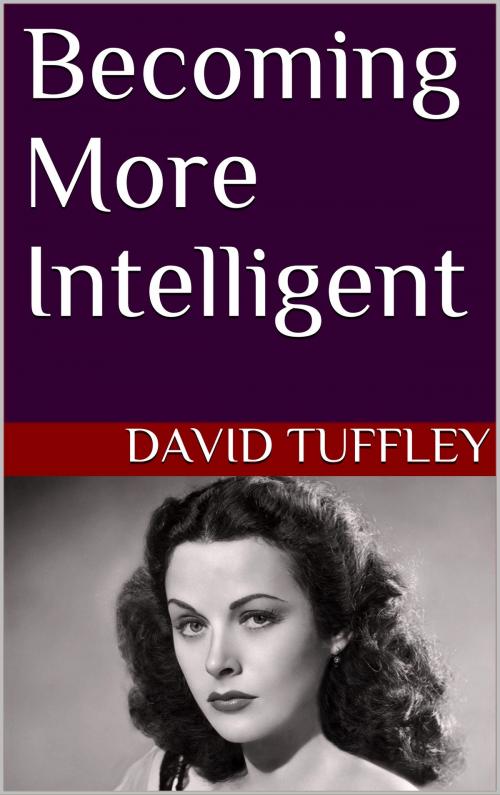Becoming More Intelligent
Nonfiction, Health & Well Being, Self Help, Self Improvement, Creativity, Psychology, Cognitive Psychology| Author: | David Tuffley | ISBN: | 9781311505972 |
| Publisher: | Altiora Publications | Publication: | April 7, 2014 |
| Imprint: | Smashwords Edition | Language: | English |
| Author: | David Tuffley |
| ISBN: | 9781311505972 |
| Publisher: | Altiora Publications |
| Publication: | April 7, 2014 |
| Imprint: | Smashwords Edition |
| Language: | English |
Your brain is a truly remarkable thing. Neuroscience tells us that it is the most complex biological structure ever to have existed on this planet. It was made to work and work hard, probably well beyond its current level.
You have the potential to raise your cognitive capacity beyond where it is now or where it was in the past. This statement runs counter to the common belief that as we get older, our brains inevitably go into decline. This is not true. There is no shortage of cases where people in their 90’s and beyond have minds that are still sharp and productively creative.
In the absence of neurological disease, the decline in brain function as people age has much to do with settling into established and increasingly inflexible ways of thinking that has few new challenges. It is the mental equivalent of spending your days in a comfortable armchair, getting no exercise and watching mind-numbing TV. Sooner or later, your body, like your brain will atrophy through lack of use.
Based on the work of the psychologist Howard Gardner, we know that there are no less than nine different kinds of intelligence that we all possess to some degree. Typically, one or two types are more developed in a person, while the remaining types are less developed or dormant.
This eBook explains in detail about each of the nine types, and gives you action exercises to help you develop each of them to a higher level. It does promise to make you a genius, but if you follow the advice, it can definitely help you to expand your cognitive repertoire so that you can bring other modalities of intelligence to bear on the challenges that face us all in everyday life.
Multiple Intelligences.
Harvard psychologist Howard Gardner is well-known for his work on multiple intelligences. Since its emergence in the 1980’s, Gardner’s work is still generates debate, yet many psychologists believe it contributes greatly to a more comprehensive understanding of the nature of intelligence than that offered by the standard IQ test.
The nine types include; Naturalistic intelligence, Bodily-kinaesthetic intelligence, Linguistic intelligence, Interpersonal intelligence, Spatial intelligence, Logical-mathematical intelligence, Musical intelligence, Intra-personal intelligence, and Existential intelligence.
We possess all nine of these intelligences to a greater or lesser degree. Some remain dormant, while others are expressed more fully. Understanding something of these different modalities of intelligence will be of great help in recognising where your strengths lie. It can give you guidance on which ones might benefit from being enhanced in order to bring about a more balanced profile.
Establishing a balanced profile across the nine types of intelligence will make you much more effective at meeting the challenges of life because your ‘cognitive toolkit’ has been greatly expanded. You will be able to use the most appropriate tool for the task, or perhaps a combination of tools might be found to work best.
It is a tragedy and a terrible waste of potential that standardised school curriculums and intelligence tests that favour one kind of intelligence over others has produced generation after generation of people who believe they are not very bright. After all, their results at school and the comments from their parents and teachers seem to suggest this.
A person who is well-endowed with some types of intelligence may have performed poorly on school curriculums based on the standard IQ assessment methods. A person with high Intra-personal intelligence would probably not engage with set school curriculums, even though they possess highly developed intuitive knowledge that gives them deep insight into people and situations. Arguably such a person is no less ‘smart’ than someone with highly developed mathematical ability.
Your brain is a truly remarkable thing. Neuroscience tells us that it is the most complex biological structure ever to have existed on this planet. It was made to work and work hard, probably well beyond its current level.
You have the potential to raise your cognitive capacity beyond where it is now or where it was in the past. This statement runs counter to the common belief that as we get older, our brains inevitably go into decline. This is not true. There is no shortage of cases where people in their 90’s and beyond have minds that are still sharp and productively creative.
In the absence of neurological disease, the decline in brain function as people age has much to do with settling into established and increasingly inflexible ways of thinking that has few new challenges. It is the mental equivalent of spending your days in a comfortable armchair, getting no exercise and watching mind-numbing TV. Sooner or later, your body, like your brain will atrophy through lack of use.
Based on the work of the psychologist Howard Gardner, we know that there are no less than nine different kinds of intelligence that we all possess to some degree. Typically, one or two types are more developed in a person, while the remaining types are less developed or dormant.
This eBook explains in detail about each of the nine types, and gives you action exercises to help you develop each of them to a higher level. It does promise to make you a genius, but if you follow the advice, it can definitely help you to expand your cognitive repertoire so that you can bring other modalities of intelligence to bear on the challenges that face us all in everyday life.
Multiple Intelligences.
Harvard psychologist Howard Gardner is well-known for his work on multiple intelligences. Since its emergence in the 1980’s, Gardner’s work is still generates debate, yet many psychologists believe it contributes greatly to a more comprehensive understanding of the nature of intelligence than that offered by the standard IQ test.
The nine types include; Naturalistic intelligence, Bodily-kinaesthetic intelligence, Linguistic intelligence, Interpersonal intelligence, Spatial intelligence, Logical-mathematical intelligence, Musical intelligence, Intra-personal intelligence, and Existential intelligence.
We possess all nine of these intelligences to a greater or lesser degree. Some remain dormant, while others are expressed more fully. Understanding something of these different modalities of intelligence will be of great help in recognising where your strengths lie. It can give you guidance on which ones might benefit from being enhanced in order to bring about a more balanced profile.
Establishing a balanced profile across the nine types of intelligence will make you much more effective at meeting the challenges of life because your ‘cognitive toolkit’ has been greatly expanded. You will be able to use the most appropriate tool for the task, or perhaps a combination of tools might be found to work best.
It is a tragedy and a terrible waste of potential that standardised school curriculums and intelligence tests that favour one kind of intelligence over others has produced generation after generation of people who believe they are not very bright. After all, their results at school and the comments from their parents and teachers seem to suggest this.
A person who is well-endowed with some types of intelligence may have performed poorly on school curriculums based on the standard IQ assessment methods. A person with high Intra-personal intelligence would probably not engage with set school curriculums, even though they possess highly developed intuitive knowledge that gives them deep insight into people and situations. Arguably such a person is no less ‘smart’ than someone with highly developed mathematical ability.















